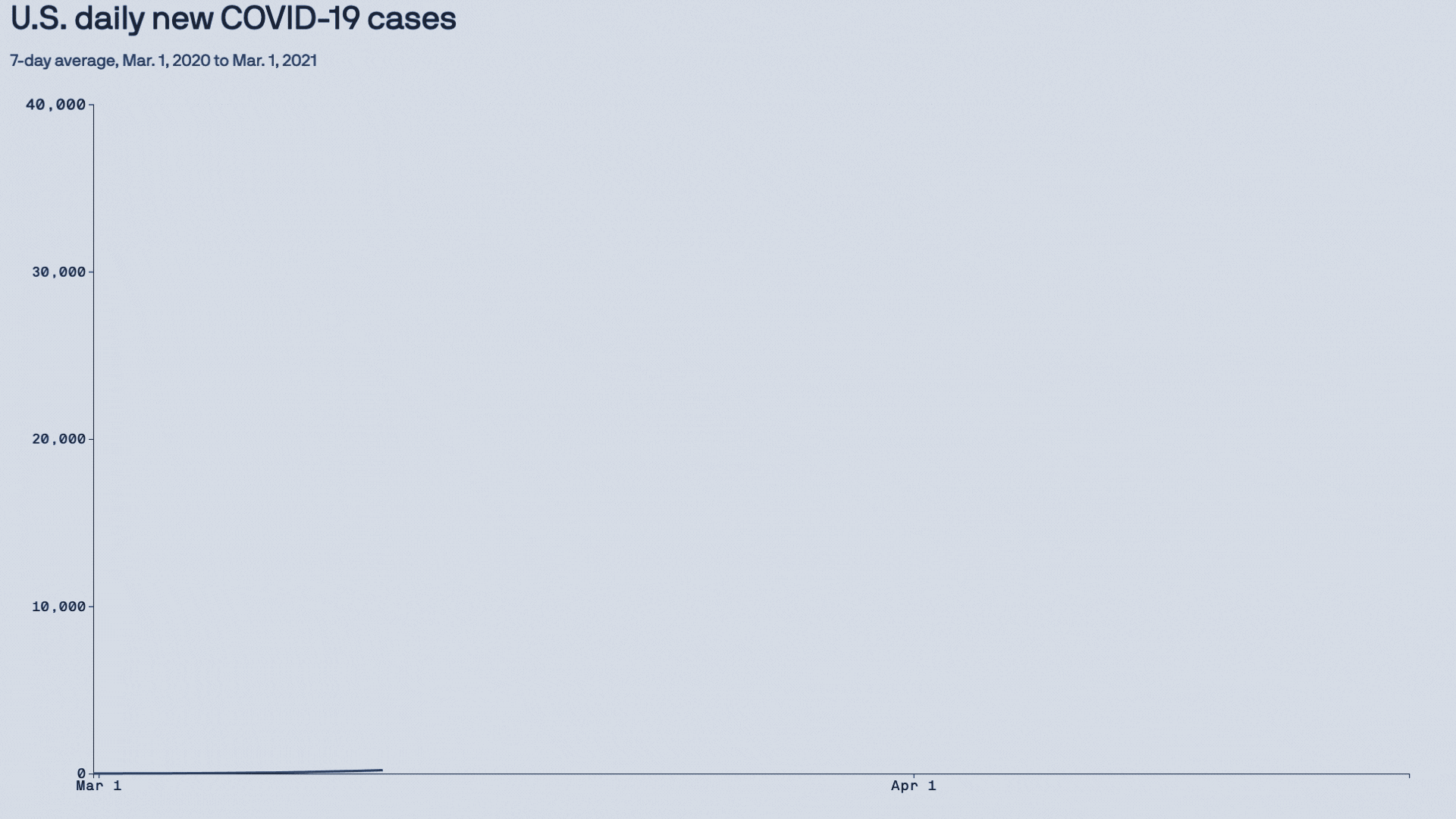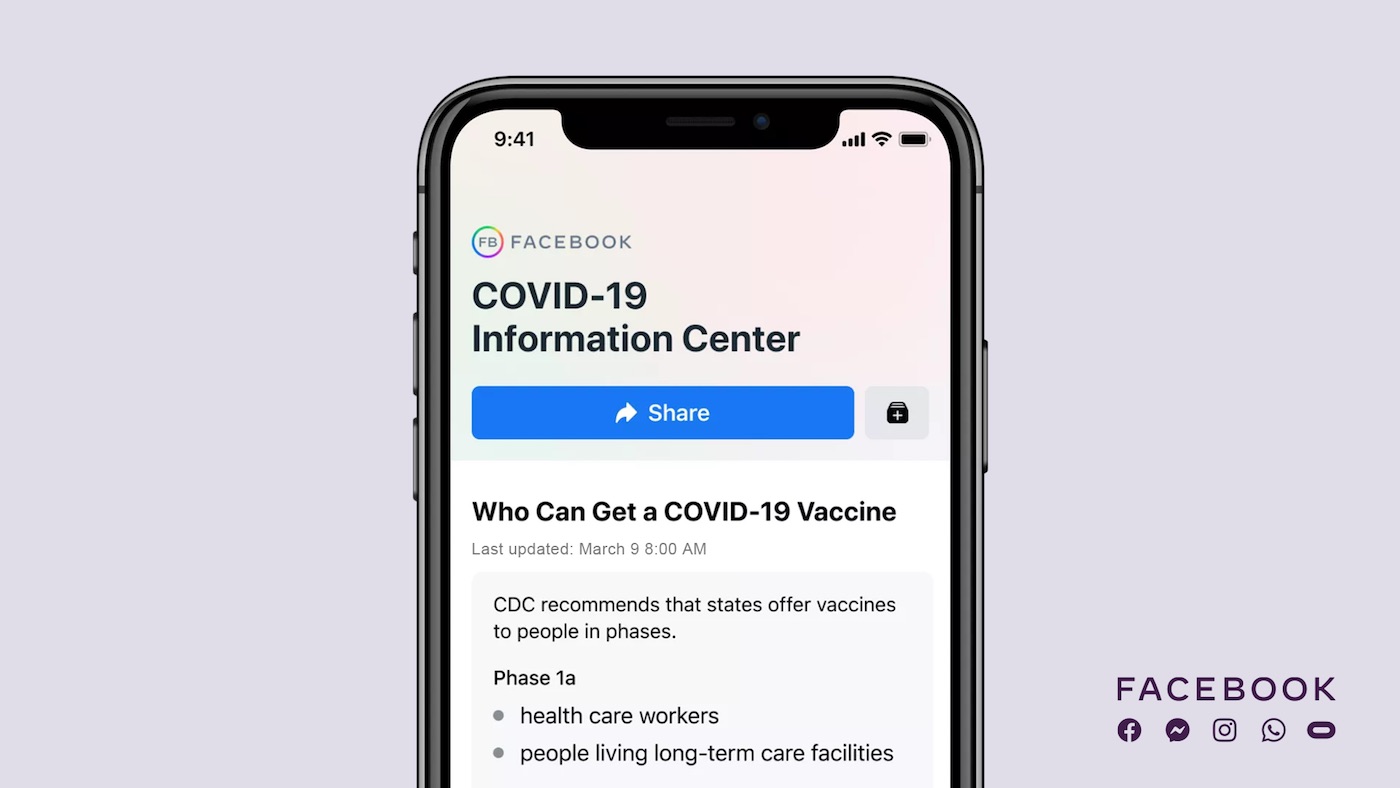| |
| |
| |
| Presented By Facebook |
| |
| Axios AM Deep Dive |
| By Mike Allen ·Mar 13, 2021 |
| Good afternoon and welcome to the first Deep Dive driven by our top-shelf Axios Visuals team. - 2020 was a literally off-the-charts year. This edition, led by Danielle Alberti and Sarah Grillo, illuminates the deep impact COVID-19 had on American lives over the past year.
Today's Smart Brevity™ count: 644 words, a 2½ -minute read. |
| |
| |
| 1 big thing: The year the y-axis broke |
 |
|
| Data: New York Times; Chart: Michelle McGhee/Axios |
| |
| In a year that smashed a lot of records, another trend became apparent to data journalists: Charts were showing shocking shifts in unemployment, debt, anxiety and depression, alcohol use and worldwide deaths — sometimes climbing at nearly 90-degree angles, Danielle and Sarah write. Why it matters: Changes that typically take months or years to show up on a trend line started happening. The result is twofold: - Y-axes need to be continually adjusted to accommodate ever-higher numbers.
- Longer term, there's now a year of graphical outliers that future charts will have to account for.
The U.S. officially declared the pandemic a national emergency one year ago today, on March 13. But the visuals team could see it coming much earlier, as we tracked the infection's worldwide spread and the escalating trajectory of deaths via maps, timelines and charts. The bottom line: The pandemic will be breaking the axis for decades to come. |
    |
| |
| |
| 2. Devastation for working women |
 Data: FRED. Graphic: Michelle McGhee and Aïda Amer/Axios American women outnumbered men in the labor market in February 2020. Then COVID hit. More than 2 million women dropped out of the workforce, compared with 1.7 million men, Erica Pandey reports. - The big picture: The pandemic erased decades of women's workplace progress.
|
    |
| |
| |
| 3. Entrepreneurs seek lockdown luck |
 Starting a new business in the middle of a global pandemic is daunting. But the uncertainty of an uneven recovery in employment, coupled with the unusual lockdown circumstances, drove hundreds of thousands of Americans to do just that, Aja Whitaker-Moore reports. - Why it matters: The rate at which entrepreneurs kick-started companies over the past year far outpaced that of the Great Recession.
|
    |
| |
| |
| A message from Facebook |
| How Facebook is supporting the COVID-19 vaccination effort |
| |
 |
| |
| Facebook is running the largest worldwide campaign promoting authoritative COVID-19 vaccine information. The background: We're helping people learn when and where they can get vaccinated, giving free ad credits to governments and NGOs and expanding efforts to remove false vaccine claims. |
| |
| |
| 4. Mapped: Behind on rent |
 Data: Center on Budget and Policy Priorities, based on estimates from U.S. Census Bureau's Household Pulse Surveys. Graphic: Will Chase/Axios Nearly 1 in 5 renters are behind on rent, one year into the pandemic, Will Chase reports. - Census Bureau data show that Delaware and Michigan were hit hardest, with a quarter of their renters unable to catch up on payments. Most states hover between 10%–20%.
Why it matters: Eviction during a pandemic can be deadly. |
    |
| |
| |
| 5. Home cooking |
 Data: Census Bureau via YCharts; Chart: Sara Wise and Annelise Capossela/Axios The pandemic has profoundly changed the way America eats. We've cracked the norm (that started in 2015) of spending more money at restaurants and bars than grocery stores, Felix Salmon writes. - Why it matters: For the past year, a special occasion meal has meant one cooked lovingly at home. Millions of Americans have lost the habit of eating out regularly.
|
    |
| |
| |
| 6. How far flu fell |
 Data: CDC; Chart: Sara Wise/Axios Nowhere is there a better broken axis — or probably a silver lining — than in the number of deaths from the seasonal flu this year, Eileen Drage O'Reilly writes. - What we're watching: Whether anti-COVID measures managed to eradicate enough influenza variants that next year's season will also be mild.
|
    |
| |
| |
| 7. The two-speed economy |
 The staggering split in two slices of America's economy — goods and services — isn't going to close until America starts shifting more spending toward things to do rather than things, Courtenay Brown writes. - Why it matters: The understandably sluggish rebound in spending on services has kept a lid on economic growth. America won't get back to full speed without services, given its outsized importance to the U.S. economy.
|
    |
| |
| |
| 8. Kids' screen-time surge |
 Data: Common Sense Media. Graphic: Will Chase and Sarah Grillo/Axios Kids' screen time has exploded as more activities moved online, Sara Fischer reports. - Time spent on YouTube and gaming platforms has especially accelerated, according to data from kid-tech company SuperAwesome.
|
    |
| |
| |
| 9. Travel throttled |
 Data: Apple Maps; Graphic: Danielle Alberti and Brendan Lynch Lockdowns and the economic crisis brought unprecedented movement declines in the U.S. and worldwide, and the bounce back is uneven among types of travel, Ben Geman reports. |
    |
| |
| |
| 10. Parting shot |
 |
|
| Kurdish New Year in 2019 (left). Employees on lunch break in Wuhan in 2020. Photos: Micah Garen and STR/AFP via Getty Images |
| |
| Top photos for a given month in 2019 compared to that same month in 2020 provide a peek into how our lives changed, Aïda Amer posts. Why it matters: Photography is a valuable tool in tracking our collective memory. These photos serve as a permanent reminder of our (hopefully temporary) altered lives. Compare more photos. |
    |
| |
| |
| A message from Facebook |
| Get timely, reliable information about COVID-19 and vaccines |
| |
 |
| |
Visit the COVID-19 Information Center to learn more about: - When and where you can get the COVID-19 vaccine.
- Real-time updates from national health authorities and global organizations.
- Tips and resources to stop community spread and support emotional health.
|
| |
| 🎧 We hope you'll check out Dan Primack's "Axios Re:Cap" podcast series, "The Week America Changed," including interviews with Ron Klain, Anthony Fauci, Sheryl Sanderberg, NBA Commissioner Adam Silver and more. |
No comments:
Post a Comment